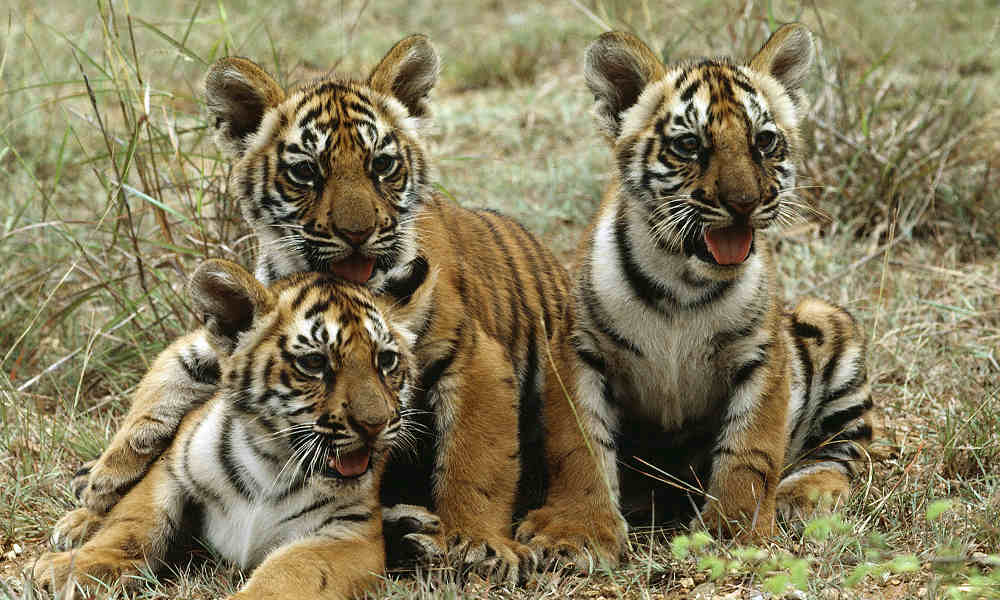New
COVID-19 in animals: 4 tigers and 3 lions at the Bronx Zoo
Four tigers and three lions tested positive for COVID-19 at the Bronx Zoo in New York City in April 2020. Click on the buttons below for the latest information.
[expand title=”April 22: WCS – Press release”]
Update: Bronx Zoo Tigers and Lions Recovering from COVID-19
New York, April 22, 2020 – The following update was issued by WCS’s Bronx Zoo today:
On April 5, 2020, we reported that a four-year-old female Malayan tiger had tested positive for COVID-19 and three other tigers and three African lions were showing similar symptoms.
Samples for testing from the tiger, Nadia, were collected from her nose, throat, and respiratory tract while she was under anesthesia. Subsequently, we can confirm that the three other tigers in Tiger Mountain and the three African lions that exhibited a cough have also tested positive for COVID-19. This testing was done by using a fecal sample test developed by our laboratory partners that does not require the animals be placed under anesthesia. The fecal tests confirmed our suspicion that all seven cats had the infection, and also determined that one tiger at Tiger Mountain that never developed a cough was also positive for the disease.
We are grateful for the cooperation and support of the New York State Diagnostic Laboratory at Cornell University and the University of Illinois, College of Veterinary Medicine Veterinary Diagnostic Laboratory, where the initial COVID-19 testing of samples was performed and the USDA National Veterinary Services Laboratory where confirmatory testing was conducted.
All eight cats continue to do well. They are behaving normally, eating well, and their coughing is greatly reduced.
We tested the tigers and lions out of an abundance of caution and will ensure any knowledge we gain about COVID-19 will contribute to the world’s continuing understanding of this novel coronavirus. The testing of these cats was done in veterinary laboratories and resources used did not take from those being used for human testing.
None of the zoo’s snow leopards, cheetahs, clouded leopard, Amur leopard, puma or serval are showing any signs of illness. Our cats were infected by a staff person who was asymptomatically infected with the virus or before that person developed symptoms. Preventive measures are now in place for all staff who are caring for them, and the other cats in our four WCS zoos, to prevent further exposure of any of our felids in our zoos to the disease.
COVID-19 is a disease caused by the coronavirus known as SARS-CoV-2. It is believed that the virus was first transferred to people at a food market that trades in wildlife in Wuhan, China. There is no evidence that animals play a role in the transmission of COVID-19 to people other than the initial event in the Wuhan market, and no evidence that any person has been infected with COVID-19 in the US by animals, including by pet dogs or cats.
We will issue additional information as warranted. Our four zoos and aquarium have been temporarily closed since March 16.
###[/expand]
[expand title=”April 17: USDA – Follow-up report No. 1″]
By: Dr Mark Davidson
Associate Administrator
USDA-APHIS, U.S. Department of Agriculture
Summary
[wptb id=29980]
Epidemiology
[wptb id=29981]
Control measures
[wptb id=29984]
Diagnostic test results
[wptb id=29986][/expand]
[expand title=”April 10: WCS – Press release”]
Update On the Bronx Zoo on Tiger Which Tested Positive for COVID-19: Nadia’s Condition Improving – Along with the Condition of the Other Tigers and Lions Which Had Similar Symptoms
New York, April 10, 2020 – The following update was issued by the Wildlife Conservation Society’s Bronx Zoo:
We are pleased to report that since the USDA and Bronx Zoo made the announcement on Sunday that one of our female Malayan tigers tested positive for COVID-19, her condition continues to improve, along with the other three tigers and three African lions that exhibited similar symptoms. Nadia and the other cats are behaving normally, eating well, and their coughing is greatly reduced. We anticipate continued improvement in the coming days. We know the cats came into contact with one or more asymptomatic staff members.
Nadia was the first animal to exhibit symptoms, and the samples collected to assess her condition during a physical exam were processed at a veterinary laboratory. Other than these seven cats, no other animals at the Bronx have developed symptoms. We conducted the test out of an abundance of caution, and the information we learn from this case will be shared with the zoo, wildlife conservation and human health communities.
We have been contacted by zoos from across the country and around the world who are thankful that we reported on Nadia’s condition, and they are adjusting their operating protocols with felids during this pandemic as we have.
We have appreciated all the interest regarding Nadia, our other big cats, and thank everyone for their concern.
###[/expand]
[expand title=”April 6: USDA – initial notification”]
By: Dr Mark Davidson
Associate Administrator
USDA-APHIS, U.S. Department of Agriculture
Summary
[wptb id=29976]
Outbreak
[wptb id=29974]
Affected population: Adult lions and tigers in a zoo.
[wptb id=29971]
*Removed from the susceptible population through death, destruction and/or slaughter
Epidemiology
[wptb id=29969]
Control measures
[wptb id=29966]
Diagnostic test results
[wptb id=29962][/expand]
[expand title=”April 5: WCS – Press release”]

A Tiger at Bronx Zoo Tests Positive for COVID-19; The Tiger and the Zoo’s Other Cats Are Doing Well at This Time
Bronx NY, April 5, 2020 — The following information was released today by the Wildlife Conservation Society’s Bronx Zoo:
Nadia, a 4-year-old female Malayan tiger at the Bronx Zoo, has tested positive for COVID-19. She, her sister Azul, two Amur tigers, and three African lions had developed a dry cough and all are expected to recover.
This positive COVID-19 test for the tiger was confirmed by USDA’s National Veterinary Services Laboratory, based in Ames, Iowa.
We tested the cat out of an abundance of caution and will ensure any knowledge we gain about COVID-19 will contribute to the world’s continuing understanding of this novel coronavirus.
Though they have experienced some decrease in appetite, the cats at the Bronx Zoo are otherwise doing well under veterinary care and are bright, alert, and interactive with their keepers. It is not known how this disease will develop in big cats since different species can react differently to novel infections, but we will continue to monitor them closely and anticipate full recoveries.
The four affected tigers live in the zoo’s Tiger Mountain exhibit. One male Amur tiger that also lives at Tiger Mountain has not exhibited any clinical signs, and a Malayan tiger and two Amur tigers at the zoo’s Wild Asia exhibit have also not exhibited any clinical signs.
None of the zoo’s snow leopards, cheetahs, clouded leopard, Amur leopard, puma or serval are showing any signs of illness. Our cats were infected by a person caring for them who was asymptomatically infected with the virus or before that person developed symptoms. Appropriate preventive measures are now in place for all staff who are caring for them, and the other cats in our four WCS zoos, to prevent further exposure of any other of our zoo cats.
We are grateful for the cooperation and support of the New York State Diagnostic Laboratory at Cornell University and the University of Illinois College of Veterinary Medicine Veterinary Diagnostic Laboratory, where the initial COVID-19 testing of samples from the tiger were performed; the USDA National Veterinary Services Laboratory where confirmatory testing was conducted; USDA Animal and Plant Health Inspection Service; and the New York and Illinois State Veterinarians and the New York City Department of Health and Mental Hygiene for their assistance.
COVID-19 is a disease caused by the coronavirus known as SARS-CoV-2. It is believed that the virus was first transferred to people at a food market that trades in wildlife in Wuhan, China. There is no evidence that animals play a role in the transmission of COVID-19 to people other than the initial event in the Wuhan market, and no evidence that any person has been infected with COVID-19 in the US by animals, including by pet dogs or cats.
We will issue additional information as warranted. Our four zoos and aquarium have been temporarily closed since March 16.
###[/expand]
Click here for other COVID-19 cases in animals.

-

 Legal6 days ago
Legal6 days agoFirefighters ambushed while responding to Idaho wildfire, at least 2 killed
-

 US News1 week ago
US News1 week agoSmall meteorite fragment may have struck Georgia home
-

 Legal1 week ago
Legal1 week agoArmed woman blocks traffic on freeway in Houston, Texas
-

 Legal1 week ago
Legal1 week agoWashington Post journalist Thomas LeGro arrested for child porn possession
-

 World6 days ago
World6 days agoTropical Storm Barry forms in the Gulf, expected to make landfall in eastern Mexico
-

 Business1 week ago
Business1 week agoU.S. sanctions 3 Mexican financial firms over fentanyl-linked money laundering
-

 Legal4 days ago
Legal4 days agoOvidio Guzmán, son of ‘El Chapo,’ to plead guilty in Chicago drug trafficking case
-

 US News4 days ago
US News4 days agoMassive explosions reported at fireworks site in Yolo County, California




